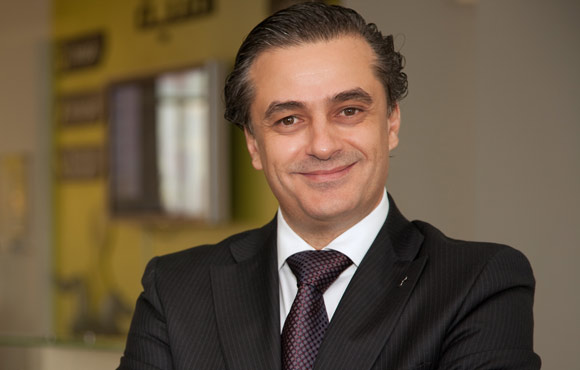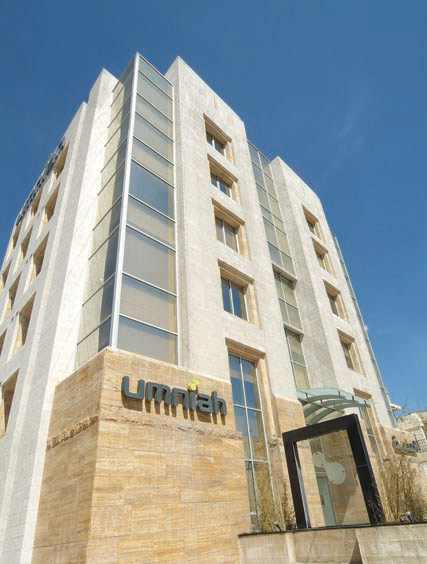Umniah Jordan
We have always been leaders in introducing new services to our customers.
Interview with Ihab Hinnawi, CEO of Umniah

What is your overall assessment of the ICT and telecom sector in Jordan?
We consider Jordan to be at the forefront of pan-Arab political and regulatory environments. We are amongst the very few countries that have liberalized their telecom sectors, and this has served as a good platform for the telecom industry here. It has also increased the appetite for global players to invest in the country. We enjoy a decent infrastructure, be it wireless or fiber connectivity. There is considerable room for improvement, of course, but we are in a good position globally.
What is your perception of the regulatory environment and what areas should be improved to facilitate your operations?
We have a good relationship with the TRC; nonetheless, we cannot always agree on every issue. Umniah is a challenger, a newcomer to the market, and our issues are different from those of other incumbent telecom players. We do believe that Jordan’s regulatory environment is a good one, but it needs to improve in many areas to accelerate the liberalization process. The biggest challenge the sector is facing is that more than 50% of every Jordanian dinar paid by the consumer goes to the Government treasury in different forms of fees, taxes and revenue share. We are also facing a number of other challenges including the introduction of new technologies which are important to us as operators mainly local loop or bitstream unbundling and number portability. We believe that these technologies will pave the way for much development in the sector.
Mobile penetration now stands at around 110%, and there are 4 operators. How much differentiation can be offered to this saturated market and how can you compete with the others?
Umniah entered the market as the fourth operator in the country and the third GSM operator. When we received our license, the penetration rate in the Kingdom was around 25%. By the time we launched Umniah, penetration had risen to around 37%. Our entrance to the market stimulated competition and offered customers real value for money. We also tangibly contributed to enabling Jordan’s mobile sector to reach its highest maturity stage. In order to offer something different, you need to be innovative in terms of services offered to the customer and we are now focusing on increasing mobile broadband penetration, which we believe is a key segment for future growth.
Orange thinks of themselves as a price-setter. Zain is focusing on content and applications. What is your strategy?
We offer value for money. We have always been leaders in introducing new services to our customers; we were the first to introduce the per-second tariff plans, which has a major impact when you talk about value for money. We are still the only operator that charges per second, and it makes a big difference on the subscribers’ final bill. We also focus on specific market segmentation, creating offers that specifically target each segment’s unique needs and interests. An example would be the youth segment, which we further sub-segmented to even more specific attributes and approached using their own language to present them with what they really need.

What market share have you been able to attract? What are your future goals?
We control close to 30% of the market share. This is significant given Jordan’s low-purchasing power, its relatively low GDP per capita, and its extremely competitive telecom market. In the coming five years, I think we will be leading mobile penetration in the country. Our next phase is focusing on other segments, such as corporate and postpaid.
What is your major challenge?
Strategies are not stagnant. They are dynamic. We always challenge our strategies in order to keep ourselves immune from attacks in the market. Our business model from day one has been designed to prepare us to work in a very competitive market; that’s why we have continuously managed to maintain very good rates and low costs, enabling us to gain about 30% of the market. Since our inception, we have been based on relatively low cost operations, allowing for decent margins of profit. Our cost structure is much less than that of other operators, and it is not easy to replicate. The most difficult part of any operation is how to control the cost structure, especially if you have been in the market for many years. We decided we don’t want to own our own shops and spend millions; we would get dealers, pick certain shops for them, brand the shops, train the dealers, and control the whole thing, and the cost ends up being completely different. It’s a dynamic model.
How do you see the convergence of voice and other services?
Convergence is happening but in a radically different way than how it began five years ago. Today, convergence is more about the customer experience and not about the technology or bundling itself. New devices and applications are constantly being introduced and developed, and the subscriber does not care which operator they are using as long as they are getting the services they want. Content plays a major role and I believe convergence will become increasingly prominent with time.
With the government’s number one priority of spreading broadband across the country, how do you compete with other companies that have larger market shares, such as Orange?
While Orange has 50% of the market share on DSL, we hold a WiMAX license and were the first operator in Jordan to introduce WiMAX wireless broadband services in the Kingdom, and have already begun offering fixed broadband wireless access to compete against DSL; we believe that as it matures, WiMAX technology will become one of the main contenders with ADSL. We are also studying the feasibility and value of investing in 3G, and later on 4G, technologies to further expand our range of services, harness the most current industry trends, and meet changing consumer demands. In aiming to spread broadband across the country, we face the challenges of PC penetration, affordability for the subscriber, the costs associated with services like WiMAX, and a cultural challenge wherein some people still don’t believe that the Internet is a necessity. Overall, the government needs to take some steps to help the private sector to invest in a proper broadband infrastructure that increases penetration levels. If we don’t offer broadband Internet at something around $10 a month, I don’t see a real leap in the penetration rate, and this will not happen unless exemptions are granted. The government started with some reductions in sales tax as well as some custom and spectrum exemptions, but more support is needed. If you want to create a knowledge-based economy, you need high Internet penetration rates.
Do you deal with international customers, such as companies that want to invest in Jordan?
One of the ICT strategy’s main objectives is to position Jordan as a hub for the region. As a Jordanian company, we actively contribute to realizing this goal through encouraging international companies to establish their regional headquarters in Jordan. Jordan enjoys all the ingredients that the giants need to successfully manage their regional operations. The benefits of attracting them to Jordan will push the entire economy and ICT sector forward. It will also put pressure on key players inside the Kingdom to achieve more, enhance and facilitate the transfer of knowledge. We believe that this is more important to us than getting direct benefits from one or two deals.
What is your policy for dealing with corporate social responsibility (CSR)?
CSR is one of our main strategies and is very much a large part of our corporate identity. We view ourselves as an integral player in the local community, and as such we strive to create and participate in proactive CSR programs that contribute to improving the quality of life for all Jordanians. Our comprehensive CSR umbrella ensures that we belong to everything positive in the country, from education, to youth, to health, sports, culture and arts, environment and the community as a whole. For example, we are one of the main contributors to the Madrasati Initiative spearheaded by Her Majesty Queen Rania, through which we adopted five public schools and renovated their infrastructure to provide a better learning environment for the students.
Another project is the Umniah Community Computer Training (UCCT) Center under the ‘Umniah Computer Learning Initiative’, where we provide underprivileged Jordanians with a full training course on Microsoft applications free of charge, granting them a certificate at the end that helps them increase their income or job opportunities. We also express our belonging to the community through our own program “Urdon Al Khair… Umniah Al Khair” that was so far held for two consecutive years during the holy month of Ramdan.
Through the program Umniah provides 15 Jordanian families chosen from different governorates across the Kingdom with sustainable employment opportunities, empowering them to overcome the economic challenges they face by helping them establish and expand their own productive projects to optimally utilize their skills and maintain a stable source of income.
We also support the Jordan Breast Cancer Program as part of our belief in the importance of spreading awareness on the disease amongst the public in general and women in particular. With regards to sports in the Kingdom, we are also the main partner of Al-Riyadi Club for Basketball and have supported the Basketball World Championship and other sports, including the Umniah Karting League, to promote good sportsmanship among Jordan’s youth. In addition, we have built six public playgrounds in partnership with the Greater Amman Municipality in underprivileged areas throughout the Kingdom to provide much-needed, safe and accessible playgrounds for children. Moreover, we have launched an environment initiative for our employees “Umniah Green” which is an internal initiative that strives to effectively reduce the company’s carbon footprint as an organization (water, energy, paper and plastic).
This campaign works on raising the level of awareness at the employee level on the value and benefits of material consumption management and recycling. It also includes the adoption of specific actions towards the preservations of the Kingdom’s natural resources. We always strive to keep our employees engaged with the community through all our initiatives and activities.
These are only a few of the many CSR activities that we regularly carry out every year. As a socially responsible company, we are aware that our business has a direct and an indirect impact on the society we operate in..
What is your stance on social media?
Social media plays an increasingly important role in our communications strategy, and we actively employ social media platforms such as Facebook, Twitter and Youtube to engage with the public and our customers. Our online fan base is continuously growing, especially on our Facebook fan page, which we use to continuously keep our fans updated on our latest competitions, offers, events and campaigns.